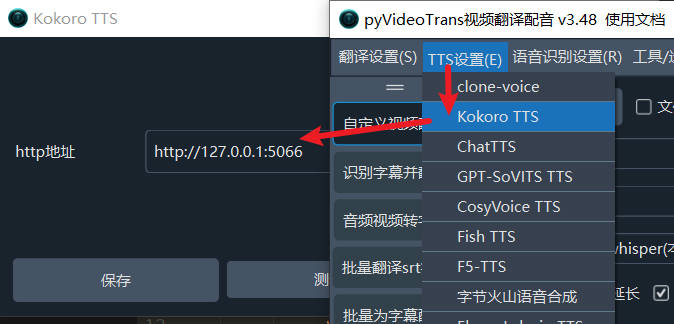This is a web UI and API project for the kokoro TTS project, supporting voice synthesis in 8 languages: Chinese, English, Japanese, French, Italian, Portuguese, Spanish, and Hindi.
Project URL: https://github.com/jianchang512/kokoro-uiapi
Web Interface

Default UI address after startup: http://127.0.0.1:5066
- Supports voice synthesis for text and SRT subtitles
- Supports online preview and download
- Supports subtitle alignment
Installation Methods
Windows
For Windows 10/11, download the integrated package and double-click start.bat to start. For GPU acceleration, ensure you have an NVIDIA graphics card and install CUDA 12.
GitHub download URL: https://github.com/jianchang512/kokoro-uiapi/releases/v0.1
Linux/MacOS
First, ensure Python 3.8+ is installed on your system; Python 3.10-3.11 is recommended.
On Linux, pre-install ffmpeg using
apt install ffmpegoryum install ffmpegOn MacOS, install ffmpeg using
brew install ffmpeg
- Clone the source code:
git clone https://github.com/jianchang512/kokoro-uiapi - Create and activate a virtual environment:
cd kokoro-uiapi python3 -m venv venv . venv/bin/activate - Install dependencies:
pip3 install -r requirements.txt - Start the application:
python3 app.py
Usage in pyVideoTrans
- First, start this project: double-click
start.batfor the Windows integrated package, or runpython3 app.pyfor source installation. - Upgrade pyVideoTrans to v3.48+, then go to Menu → TTS Settings → Kokoro TTS → HTTP Address and enter
http://127.0.0.1:5066.

OpenAI API Compatibility
The API is compatible with OpenAI TTS.
Default API address after startup: http://127.0.0.1:5066/v1/audio/speech
Request method: POST Request data: application/json
{
input: Text to synthesize,
voice: Voice role,
speed: Speech speed, default 1.0
}Returns MP3 audio data on success.
OpenAI SDK Usage Example
from openai import OpenAI
client = OpenAI(
api_key='123456',
base_url='http://127.0.0.1:5066/v1'
)
try:
response = client.audio.speech.create(
model='tts-1',
input='Hello, dear friends',
voice='zf_xiaobei',
response_format='mp3',
speed=1.0
)
with open('./test_openai.mp3', 'wb') as f:
f.write(response.content)
print("MP3 file saved successfully to test_openai.mp3")
except Exception as e:
print(f"An error occurred: {e}")Voice Role List
English voice roles:
af_alloy
af_aoede
af_bella
af_jessica
af_kore
af_nicole
af_nova
af_river
af_sarah
af_sky
am_adam
am_echo
am_eric
am_fenrir
am_liam
am_michael
am_onyx
am_puck
am_santa
bf_alice
bf_emma
bf_isabella
bf_lily
bm_daniel
bm_fable
bm_george
bm_lewisChinese voice roles:
zf_xiaobei
zf_xiaoni
zf_xiaoxiao
zf_xiaoyi
zm_yunjian
zm_yunxi
zm_yunxia
zm_yunyangJapanese voice roles:
jf_alpha
jf_gongitsune
jf_nezumi
jf_tebukuro
jm_kumoFrench voice role: ff_siwis
Italian voice roles: if_sara, im_nicola
Hindi voice roles: hf_alpha, hf_beta, hm_omega, hm_psi
Spanish voice roles: ef_dora, em_alex, em_santa
Portuguese voice roles: pf_dora, pm_alex, pm_santa
Proxy VPN
For source code deployment, voice model .pt files need to be downloaded from huggingface.co. Set up a global or system proxy in advance to ensure accessibility.
Alternatively, download the model in advance and extract it to the directory where app.py is located.
Model download URL: https://github.com/jianchang512/kokoro-uiapi/releases/download/v0.1/moxing--jieya--dao--app.py--mulu.7z
